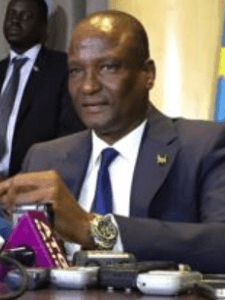Taban Deng Gai facts for kids
Quick facts for kids
Taban Deng Gai
|
|
|---|---|

Deng in 2016
|
|
| Third Vice President of South Sudan | |
| Assumed office 21 February 2020 |
|
| President | Salva Kiir Mayardit |
| Preceded by | Position established |
| 2nd First Vice President of South Sudan | |
| In office 23 July 2016 – 21 February 2020 |
|
| President | Salva Kiir Mayardit |
| Preceded by | Riek Machar |
| Succeeded by | Riek Machar |
| Personal details | |
| Born | c. 1950 Kerial, Sudan |
| Nationality | South Sudanese |
| Political party | SPLM-IO (Juba faction) |
Taban Deng Gai is an important politician from South Sudan. He has held high positions in his country's government. Since February 2020, he has been one of the Vice Presidents in the government that works together for peace. Before that, from July 2016 to February 2020, he was the First Vice President. He also worked as a minister in charge of mining.
Biography
Early Life and Family
Taban Deng Gai was born around 1950 in a village called Kerial, which is now in Unity State in South Sudan. He belongs to the Nuer ethnic group. He identifies himself as part of the Jikany Nuer subgroup.
Taban Deng Gai has close family ties to another important politician, Riek Machar. He is Machar's brother-in-law. He is also a cousin to Machar's wife, Angelina Teny.
Political Journey
During the Second Sudanese Civil War, Taban Deng Gai played several roles. He managed a refugee camp in Itang. He also led the relief efforts for the SPLA in Nasir. He was also in charge of supplies for Riek Machar's group.
When Machar's supporters formed a new group called SPLA-Nasir, Deng Gai helped them talk with the Sudanese government. This led to an agreement. Later, Deng Gai was elected governor of Unity State from 1997 to 1999. He also served as Deputy Minister of Roads and Bridges from 1999 to 2000.
He became governor of Unity State again starting in September 2005. In the elections of April 2010, he won with many votes. However, the results were questioned by his cousin, Angelina Teny. She said that Deng Gai's supporters had used force. This election caused problems between Deng Gai and his family members, including Riek Machar.
Key Roles and Agreements
When the South Sudanese Civil War began, Taban Deng Gai first joined Riek Machar's rebel group, the SPLM-IO. He became Machar's second-in-command. He was also the main person to talk with the South Sudanese government for the rebels.
In August 2015, the SPLM-IO and the government agreed to share power. Deng Gai was not happy with his assigned role as mining minister. He had wanted to be the petroleum minister. Because of this, he started working secretly with President Salva Kiir Mayardit's forces.
In April 2016, he left his role as the rebel negotiator. He said he needed to focus on being the mining minister. After a big fight in Juba in July 2016, Deng Gai officially joined the government. He then took Riek Machar's place as the First Vice President. Many rebels followed him and formed a group known as the Juba faction of the SPLM/A-IO. They started fighting alongside the government. Other rebels then saw Deng Gai as a "traitor."
As part of efforts to end the civil war, new government positions were created in 2020. Taban Deng Gai was appointed "Third Vice President of South Sudan." In this role, he has mainly focused on building new roads and other important structures. For example, he has overseen the building of a new highway connecting South Sudan and Ethiopia.
Sanctions
In January 2020, the U.S. Treasury Department placed sanctions on Taban Deng Gai. This was due to concerns about his involvement in actions that affected civilians. However, Deng Gai has said that he is not involved in such actions. He describes himself as a "man of peace."
 | James B. Knighten |
 | Azellia White |
 | Willa Brown |

